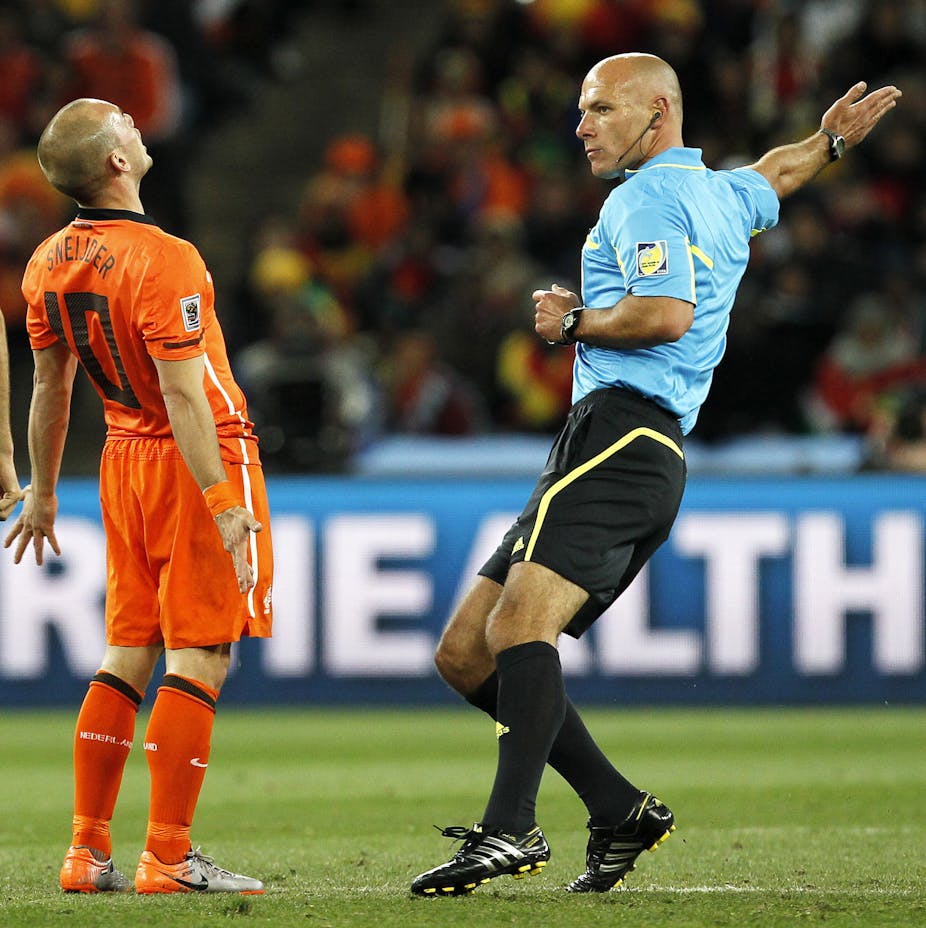Howard Webb, one of modern football’s most successful referees, has announced his retirement. Webb achieved much in his career, most notably in 2010 taking charge of the finals of both the World Cup and the Champions League. His decision to continue officiating after that season demonstrates an intense determination and drive to succeed. Now, the former police sergeant’s next challenge is to bring the youth development methods of football itself to the world of refereeing.
Webb has essentially “moved upstairs” into a senior role at his current employer, Professional Game Match Officials Limited (PGMOL) – the organisation that oversees every stage of football refereeing in England. His position, technical director, has been created specifically for him and it will be Webb’s job to help identify, train and support the next generation of talented referees from semi-professional football as they make their way through the ranks.
Webb had other options, including media work. After all, football programmes and pundits constantly question refereeing decisions and performances throughout the season, and it could have been advantageous to have a recently retired high profile referee giving their side of things (although BT Sport’s experiment with another retired ref, Mark Halsey, was hit and miss).
Webb was about as media friendly as any referee in the game today can be, especially given the demand that match officials do not speak to the media after games or explain decisions. Perhaps the media is not ready to hear views about the game from a referees’ perspective. Indeed, much of Webb’s involvement with the media was through UEFA and FIFA assignments rather than domestically, although this new role could also involve a level of media involvement.
But it is the perceived need for a refereeing technical director role at all that tells us more about modern football. Similar roles have been around for a while on the playing side of football – for instance Dan Ashworth is currently the FA’s head of elite development after a very successful spell as West Bromwich Albion’s technical director. But a similar job developing the next generation of elite referees? This is a new development, and it is clear why keeping someone with Howard Webb’s experience and profile in refereeing was considered so important.
It is clear why more talented referees are required. Football is a major industry and the financial rewards on offer can be huge. The Premier League, for instance, is now broadcast by 80 different networks, watched in 212 countries by 4.7 billion people in 643m homes. The latest round of broadcasting sales raised £3.018 billion.
Therefore the best referees are required to ensure that decision making, fitness and match performance are as close to perfect as they can be. There is so much money involved in football today that this cannot be negotiable.

However, whether fast-tracking young and talented officials into football’s upper echelons is the answer remains to be seen. It has been tried in the recent past with mixed results, and whether the experience referees have traditionally gained from promotion through the league pyramid can be replaced with additional training, mentoring and support is something often debated in refereeing circles.
Other comparable leagues in Europe, such as La Liga in Spain or Serie A in Italy, do not promote officials at such a young age. They believe referees require more experience in the lower leagues before officiating in their professional leagues.
This new role should be commended as a positive step in the development pathway for talented referees, although doubts will remain over the fast tracking of referees. Howard Webb’s role will be to try and improve this development process and ensure that more referees with potential can progress through the league system in England. Surely there is no better candidate to oversee this?

